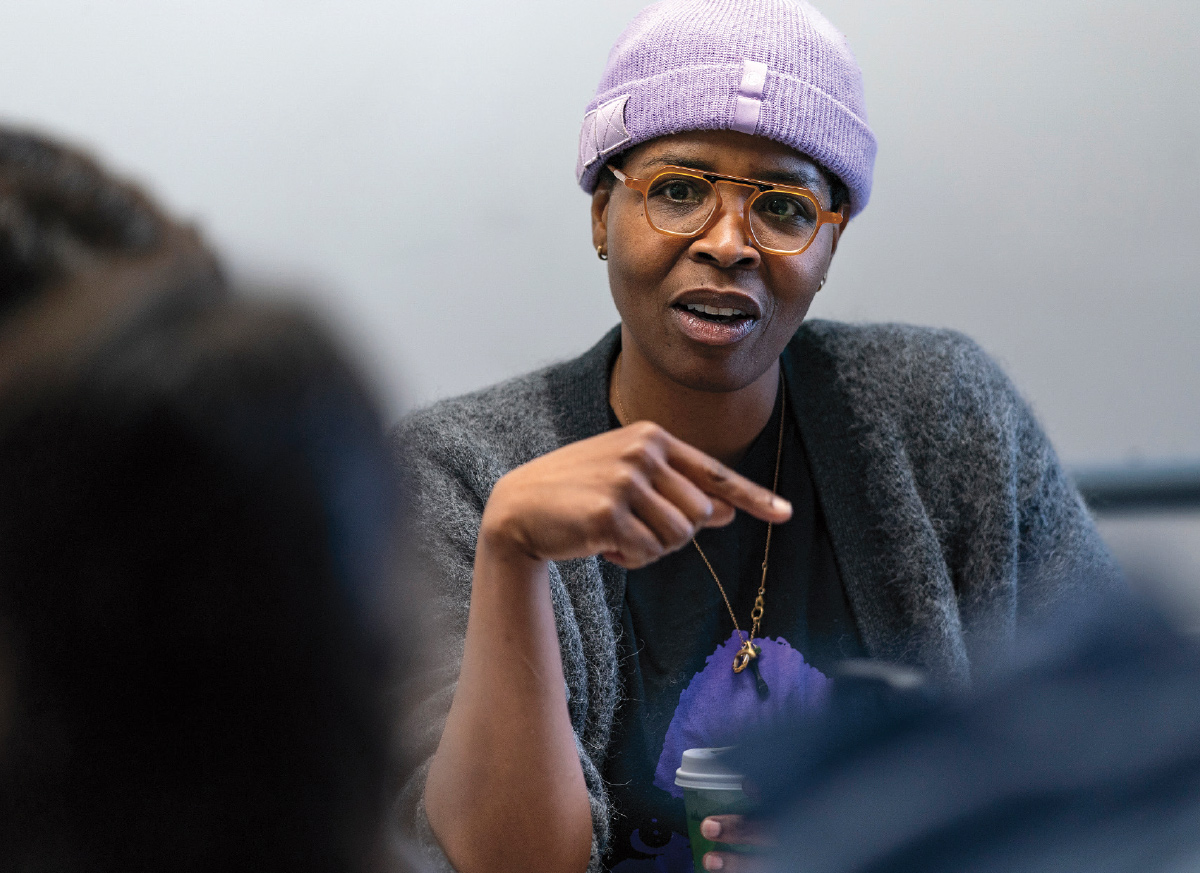
In Support of the Academic Mission
Photograph by Ashley L. Conti
The Haynesville Project, established in 2021, provides direct funding to talented teacher-scholars who are at pivotal points in their careers. Made possible by a $2-million gift from Tom and Cathy Tinsley P’10, the pilot project awards a $100,000 grant to newly tenured professors to foster creative and high-impact research projects and excellence in teaching through dependable financial commitments.
The Island Campus, comprising Allen and Benner islands, gives Colby students year-round access to a marine environment for research around climate change, the impact of air and atmospheric pollution, and the changing biodiversity of the Gulf of Maine. Colby became steward of Allen and Benner islands in 2022, acquiring them from the Up East Foundation and the Wyeth Foundation for American Art.
The Jennifer Jahrling Forese Writer-in-Residence Program was established in 2019 to build on Colby’s strengths in the literary arts and humanities. The residency is the vision of Trustee Emeritus Jamie Forese and Jennifer Forese P’16, ’18.
The Haynesville Project, which began in 2021 as a three-year pilot program, provides $100,000 grants to newly tenured faculty. It’s one example of how investments in faculty and academics have turned into tangible results for faculty, students, and the community.
As part of her grant, White will incorporate her work on the opera into her work in the classroom and community. In 2024 she will teach a Jan Plan course, Gone Mad: A Book & Printmaking Workshop, in collaboration with the Center for Book and Print, and a spring course, A Black American Opera Lab: The Poet’s Libretto. She credited her former department chair Mary Ellis Gibson, the Arthur Jeremiah Roberts Professor of Literature; Teresa McKinney, founding Diamond Family Director of the Arts; and the Haynesville Project founders, Tom and Cathy Tinsley P’10, for the opportunity to bring the opera to the stage.
To date, as part of the Dare Northward campaign, Colby has raised more money for academic innovation and partnerships than for any other area. That investment supports ongoing initiatives such as the Center for Small Town Jewish Life and the Goldfarb Center for Public Affairs at Colby, as well as new initiatives. Colby has expanded the size of its faculty from 186 to 229 as it has developed new programs, including majors in computational biology, environmental computation, and data science. It has improved startup research support for new faculty and enhanced ongoing research funding for continuing faculty, and it has created the Center for Teaching and Learning to provide support and training.
McVey Data Science Initiative, a multidisciplinary effort to integrate data science throughout the curriculum, was created with a gift from Trustee Rick McVey P’12, ’16. The initiative makes Colby one of the first liberal arts colleges to offer interdisciplinary coursework and research opportunities in data science, and it ensures that students are able to become the next generation of leaders in fields that use data in decision-making.
Pulver Science Scholars Program is designed to attract the most ambitious and talented students from all backgrounds to Colby and create a pipeline for them to pursue research at the nation’s top biomedical laboratories, including the Jackson Laboratory, Dana-Farber Cancer Institute, and Mount Desert Island Biological Laboratory. Life Trustee David Pulver ’63, P’93 and his wife, Carol P’93, made the commitment to ensure future discovery that will lead to treatments and cures in critical areas of human health.
Schmaltz Family Effective Communication Initiative was launched in 2019 to give faculty and students a systematic curriculum designed to enhance verbal communication skills. The initiative, which spans the disciplines at Colby, was funded through a gift from Trustee Emeritus Richard Schmaltz ’62, his wife, Joan Dignam Schmaltz ’63, and their family, including Heide Schmaltz Dolan ’87, Dana Schmaltz, and Megan Lasher ’15.
Michael and Eugenia Wormser Director of the Colby Libraries, established by Michael D. Wormser ’59, permanently names and supports the salary, benefits, and recruitment of the director. Kevin L. Smith was appointed the first Michael and Eugenia Wormser Director of the Colby Libraries.
The Jennifer Jahrling Forese Writer-in-Residence Program in Creative Writing, established in 2019, builds on Colby’s strengths in the literary arts and humanities. The vision of Trustee Emeritus Jamie Forese and Jennifer Forese P’16, ’18, the program allows students to work directly with the writer in residence and learn from their area of expertise.
In 2022 Colby expanded its geographic footprint, adding the Island Campus in Maine’s Muscongus Bay to its academic landscape. Colby became steward of 450-acre Allen and 50-acre Benner islands, where artist Andrew Wyeth and his wife, Betsy, turned their grand visions for art, architecture, and preservation into bold realities. Colby is using the islands as centers for learning, research, and creative inspiration. With their interdisciplinary focus on the social sciences, humanities, and natural sciences, students studying the arts, climate change, creative writing, and many other subjects have ventured to the islands for scholarship. In its first year of ownership of the islands, Colby hosted more than 100 groups and nearly 1,000 students, faculty, staff, and community members.